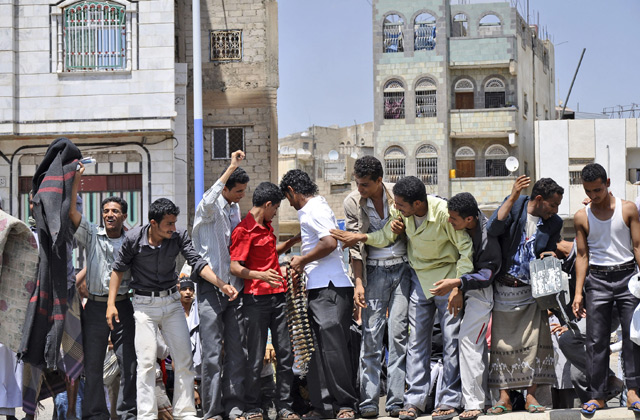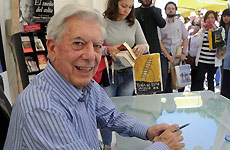The Yemeni army and police have withdrawn from the southern city of Taiz after a week of fighting against opponents of Yemeni President Ali Abdullah Saleh, which have left dozens dead. "The scenes of looting and chaos are spreading after the withdrawal of security forces and the army of the city", has secured an opposition leader who asked not to be identified.
Tareq al-Shami, spokesman of the ruling party has also confirmed the departure of troops loyal to Saleh of this city located 200 kilometers south of the capital. An activist in Taiz city indicated that its "peaceful demonstrations are becoming street fighting." However, other protesters remain hopeful about the future of the demonstrations.
Fighting between government forces and clan leaders has increased since the attack on Saleh, and is expected to continue well after he accused members of his own clan, hash, having organized the attack and called to prosecute their perpetrators. Followers Hashid clan leader, Sadik al Ahmar, have two weeks fighting with Yemeni security forces, but from the office of Al Ahmar has denied any involvement in the attack.
Internet activists have said they believe that everything was orchestrated by Saleh himself in order to continue attacking the demonstrators. The president, 69, has refused three times to sign the agreement to transfer power, which was mediated by the Gulf countries. "Unfortunately it would be a lie to say now that all the protesters are peaceful.
This can destroy what we have been creating for more than four months," said the Harazi, while armed clan leaders say fighting security forces in Sanaa and in the city of Taiz in the south to support the protesters. Many protesters are skeptical that support for fear that the growing power of tribal to seize power, which is the opposite of what they call in their demonstrations, which began in January.
Al Harazi said that the revolution sought to limit tribal power and establish a government of national reconciliation. Campaigners fear that if the tribal leaders win the battle against Saleh, the security situation could deteriorate and end up in a power struggle between clans. "There is a high probability of occurrence of this struggle for power, which would generate difficulties for the protesters.
But if they continue with their peaceful protests, could win his cause," said Yemeni political analyst Abdel Bari Taher. 


Tareq al-Shami, spokesman of the ruling party has also confirmed the departure of troops loyal to Saleh of this city located 200 kilometers south of the capital. An activist in Taiz city indicated that its "peaceful demonstrations are becoming street fighting." However, other protesters remain hopeful about the future of the demonstrations.
Fighting between government forces and clan leaders has increased since the attack on Saleh, and is expected to continue well after he accused members of his own clan, hash, having organized the attack and called to prosecute their perpetrators. Followers Hashid clan leader, Sadik al Ahmar, have two weeks fighting with Yemeni security forces, but from the office of Al Ahmar has denied any involvement in the attack.
Internet activists have said they believe that everything was orchestrated by Saleh himself in order to continue attacking the demonstrators. The president, 69, has refused three times to sign the agreement to transfer power, which was mediated by the Gulf countries. "Unfortunately it would be a lie to say now that all the protesters are peaceful.
This can destroy what we have been creating for more than four months," said the Harazi, while armed clan leaders say fighting security forces in Sanaa and in the city of Taiz in the south to support the protesters. Many protesters are skeptical that support for fear that the growing power of tribal to seize power, which is the opposite of what they call in their demonstrations, which began in January.
Al Harazi said that the revolution sought to limit tribal power and establish a government of national reconciliation. Campaigners fear that if the tribal leaders win the battle against Saleh, the security situation could deteriorate and end up in a power struggle between clans. "There is a high probability of occurrence of this struggle for power, which would generate difficulties for the protesters.
But if they continue with their peaceful protests, could win his cause," said Yemeni political analyst Abdel Bari Taher.


- Yemenis celebrate Saleh departure - Reuters (05/06/2011)
- Saleh Is in Saudi Arabia for Medical Treatment, Spokesman Says (04/06/2011)
- Saleh Is in Saudi Arabia for Medical Treatment, Spokesman Says - BusinessWeek (04/06/2011)
- Violence, jubilation in Yemen after Saleh's departure - Washington Post (05/06/2011)
- Yemen Truce Begins, Tribes Say, Amid Reports Saleh Hit in Chest (04/06/2011)
No comments:
Post a Comment